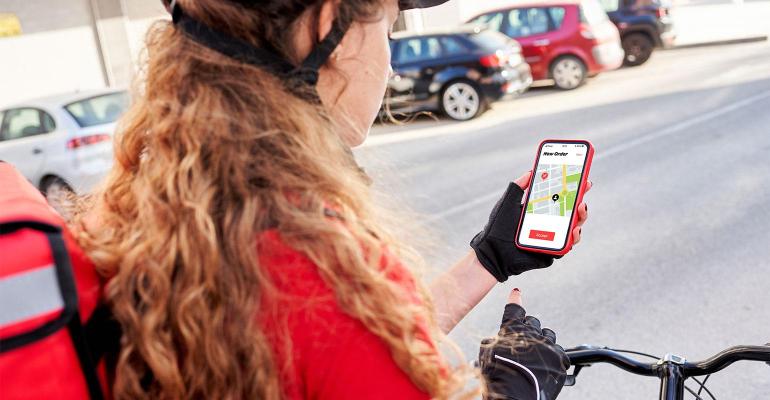As food delivery becomes synonymous with the restaurant experience — data from McKinsey and Company shows that the value of the food delivery industry has more than tripled since 2017 — the need for guardrails around the still-budding segment of the restaurant industry has grown.
The amount of both regional legislation and individual litigation attempting to regulate and mitigate issues with the food delivery industry has escalated recently. Over the past two months alone, Florida passed a bill requiring delivery apps to get permission from restaurants before arranging pickups, a New York City councilmember just proposed a bill that would require delivery apps to allow customers to tip before placing orders, and California put forth a bill that would require delivery app providers to provide an itemized breakdown of fees at checkout, including a disclosure of restaurant-facing fees.
While transparency and operator rights seem to be the goal of these pieces of legislation, recent lawsuits filed against delivery apps ask companies like DoorDash and Uber Eats to take responsibility for errors and issues with their business models. For example, Los Angeles County recently filed a lawsuit against Grubhub for false advertising and unfair business practices around disclosure of delivery fees, even claiming that restaurant suggestions for customers are featured based on how much operators pay for their placement, though Grubhub denies this, according to CBS News.
Another lawsuit by New York City restaurant Harlem Shake was filed against DoorDash for “14,000 in miscalculated fees.” In response to this lawsuit, DoorDash said that it works with operators to fix any inadvertent fees.
During the height of the pandemic, several cities and states placed fee caps on third-party delivery services — several of which became permanent after the pandemic — including San Francisco, New York City and Massachusetts.
“I think the more consumer-friendly and app-friendly legislation will not cap fees, because at that point, you could potentially drive third party delivery apps out of the market,” David Denney, hospitality attorney with the Texas-based Denney Law Group said. “But in terms of in terms of disclosures around quality control and a restaurant-facing dashboard where they can make complaints to third-party apps about being overcharged fees, that feels right to me.”
Transparency is the key word that links many of these pieces of legislation and litigation. Denney pointed to a Texas bill passed in 2022 that banned third-party delivery services from using restaurants’ logos or trademarks to promote the service in a misleading way or to add the restaurant to their platform without the business owner’s consent, similar to the law that was just passed in Florida.
“I have burger clients that do not want their burgers driving 10 miles away, because steam is terrible for French fries and buns,” Denney said. “When you have quality degradation, it reflects poorly on the restaurant—not the delivery app.”
The Texas legislation, he said, allowed restaurants to have some semblance of control over how their food was being experienced once it left their doorstep and was handed over to a food delivery driver.
Han Ly Hwang, owner of Kim Jong Grillin’ food truck, who was instrumental in advocating for delivery app policy changes in Portland, Ore., including fee caps and transparency, called delivery apps “a necessary evil” that has created the “kind of convenience people have become addicted to.”
“Until the cities are educated about [how delivery apps are profitable], they’re not going to be able to do anything,” Hwang said. “They don’t grow so quickly like this by being transparent.”
Although it might seem like a lot of the new bills passed and lawsuits being settled portray the restaurant delivery services as the “bad guys” who need to be reined in so they don’t take advantage of the small business owners, the reality is more complicated. Delivery platforms condone some of these legislative measures meant to set guidelines for interactions between delivery services, operators, and consumers. Regarding the Florida legislation, DoorDash told NRN in a statement that the company approves of the “collaborative approach” lawmakers took to “implement tools that connect customers and merchants without jeopardizing their personal information.”
“The Florida [and Texas] laws are really no different than the Department of Transportation rule that came down in 2022 that required full disclosure of all the fees and surcharges that airlines were charging to get to the total ticket price,” Denney said. “Transparency in pricing is always good: It's good for the consumer, it's good for the restaurant, and it should be good for the third-party delivery company, because that is probably where they're going to be able to compete with their competitors.”
Regulatory legislation that is meant to promote transparency in business operations — like allowing operators to easily contact their DoorDash representative when they’re overcharged, or giving them the ability to opt out of or limit deliveries — is amenable to the success of the food delivery industry, Denney argues. In the long-run, regulating the booming food delivery industry could even become the prevue of the federal government as the culture of on-demand services grows.
Contact Joanna at [email protected]m

